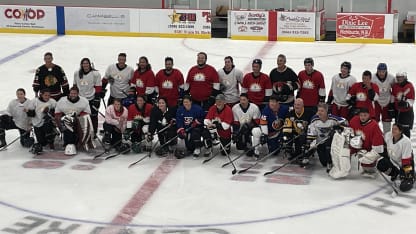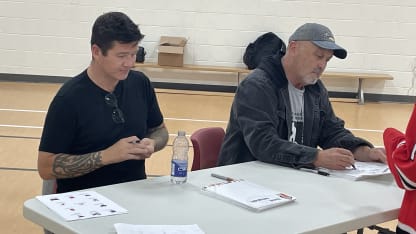Like Trottier, Jocelyne Larocque is of Metis heritage. She's the first Indigenous athlete to play women's hockey at the Olympics, where as a defenseman helped Canada win gold at the 2014 Sochi and 2022 Beijing Games and silver at Pyeongchang in 2018.
Everett Sanipass was born in Elsipogtog First Nation, played six NHL seasons for the Chicago Blackhawks and Quebec Nordiques, and is the first person of First Nation descent to be inducted into the New Brunswick Sports Hall of Fame. He's a voice for Indigenous recognition and reconciliation who educates to raise awareness for the greater good of all communities.
Hockeyville Canada 2021 is a platform Sanipass is counting on to take his endeavor to new heights.
"It's an excellent start," Sanipass said. "We need to keep building from this, create a working relationship that will promote our community and hopefully work together with local areas because we don't have a very big area here, so we can't afford to leave out anybody. I think we've been successful so far and I look forward to more in the future of these activities, for sure."
Trottier has appreciated diversity from an early age, raised in Val Marie, Saskatchewan, by his Irish mother and father of Cree Metis descent. His standing as a Hall of Famer has made him one of the greatest Indigenous players to skate in the NHL. He's staying for the festival, where he'll greet more fans and sign autographs.
"It throws a magnifying glass around that community," Trottier said. "You can feel that energy, that enthusiasm. It brings a dynamic to the community because they're fired up. Everybody gets involved."
Larocque is involved with inspiring Indigenous kids to pursue their dreams. She grew up wanting to play in the NHL not knowing women's hockey existed until it was introduced to the Olympics at the 1998 Nagano Games. It's when she realized she can play for her country and encourage young girls they can do the same.
"Those ladies on that '98 Olympic team from every country have no idea what they've done for women my age," Larocque said. "I was this close to TV every single game and I remember looking at my parents saying I want to be there one day, so it's pretty special. If I could do that even for one kid, I mean, man, that's it made a big difference in my life."
For Larocque, Sanipass and Trottier, Hockeyville has put Indigenous communities in the spotlight that they hope will glow well after the festivities. What will last is community pride. The Hockeyville Canada 2019 winner created a slogan, "We Are Renous." The tradition continues 1:18 southeast, where one can say, "We Are Elsipogtog First Nation."
"It's pretty accurate," Larocque said. "It's pretty beautiful and it's pretty powerful."



